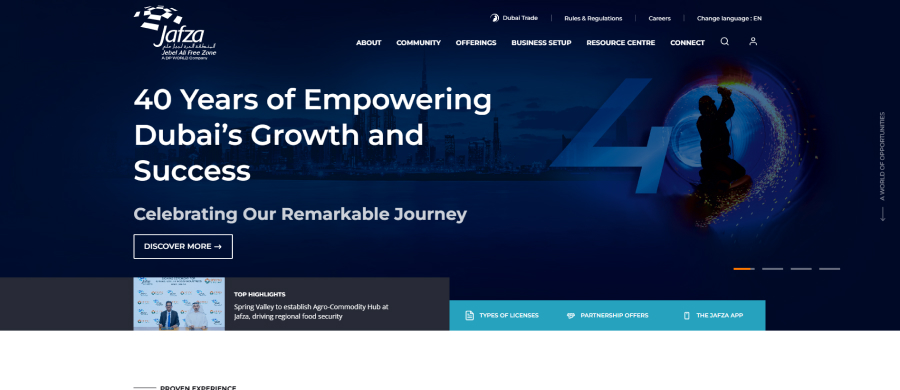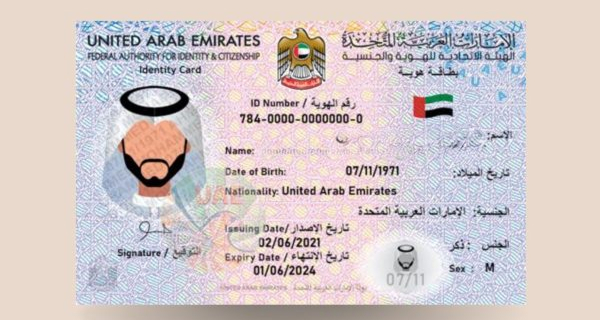Jebel Ali Free Zone business setup is one of the most recognised routes for companies that want to enter the UAE market and trade internationally. Created back in 1985, JAFZA was the country’s first free zone and has since grown into the largest, housing thousands of firms from more than 100 countries. Its position right next to Jebel Ali Port and within a short drive of Al Maktoum International Airport makes it the obvious choice for traders, logistics operators, and manufacturers who rely on global connectivity.
What sets JAFZA apart is its scale. While many free zones cater mainly to small consultancies or startups, Jebel Ali Free Zone was built to handle industrial activity, warehousing, and shipping. This means an investor can lease office space, storage, or even full production facilities under the same authority. At the same time, the licensing process has been streamlined over the years, so a new company can be incorporated with clear costs and predictable timelines.
Why Choose Jebel Ali Free Zone for Business Setup?
The Jebel Ali Free Zone is an integral part of Dubai's trading infrastructure, yet it's much more than that. Located right beside Jebel Ali Port, the busiest container port in the Middle East, and close to Al Maktoum International Airport, it gives companies direct access to two of the region’s most important transport hubs. That location alone explains part of its popularity. But the real draw is scale. JAFZA hosts thousands of firms from over 100 countries, including some of the world’s largest multinationals. For new investors, being in the same zone as those global players sends a strong signal of credibility.

Beyond the reputation, the zone offers practical benefits. Customs processes are streamlined, warehouse and office space is readily available, and company formation has been made faster with digital portals. Costs are competitive considering the facilities provided, and there are flexible packages for both small and large setups. Remote registration is also possible, which means a business can be incorporated even before the founder relocates to the UAE.
About Jebel Ali Free Zone
Jebel Ali Free Zone was launched in 1985 and became the UAE’s first free zone. It was created by the Government of Dubai as part of a strategy to attract foreign investment and link local businesses to global trade. Today it is managed by DP World, one of the world’s largest port operators, which gives it both financial backing and international recognition.
Its position in the UAE market is unique. While many zones focus on offices or small service companies, JAFZA was built to be an industrial and logistics hub. It connects directly with Jebel Ali Port’s container terminals, and through DP World’s global network, businesses inside the zone gain access to trade routes reaching more than 150 ports worldwide. That combination of government support and international reach has kept JAFZA at the center of Dubai’s economy for nearly four decades.
Business Activities Allowed in Jebel Ali Free Zone
The list of activities in JAFZA is broad, but the focus is on trade, logistics, and industry. Companies can register to import and export goods, run regional distribution centers, or operate warehouses. Manufacturers are able to lease land or ready-built facilities to set up factories, while logistics firms manage fleets and storage inside the zone. Service-oriented activities are also possible, including shipping agencies, consultancies, and support companies tied to supply chains.
Some activities do require pre-approval, particularly those connected to food, chemicals, or pharmaceuticals, since these fall under regulated industries. What makes JAFZA distinct is its ability to combine multiple activities under one authority. A business can trade, store, and manufacture within the same zone, and handle customs through the port next door. Few other free zones in the UAE can match that level of integration.
Step-by-Step Jebel Ali Free Zone Company Formation and Registration
Forming a company in JAFZA is a formal process, but it is not difficult once you know what the authority expects. The free zone has been operating for decades, so its procedures are well established. Investors who prepare the paperwork correctly can usually move from application to license within a month.
When you set up in JAFZA, you can choose from several company structures. A Free Zone Establishment (FZE) is designed for a single shareholder, while a Free Zone Company (FZCO) can have between two and fifty. Larger ventures sometimes opt for a Public Listed Company (PLC), which allows shares to be listed on an exchange. Existing firms, whether foreign or UAE-based, can register a Branch in JAFZA without creating a separate legal entity. There is also an Offshore Company option, mainly for businesses that want a legal base in the free zone while operating outside the UAE. The structure you pick will shape your liability, required documents, and compliance steps, so this decision comes before you move on to paperwork.

Want to learn more about UAE business setup services?
Required Documents and Timeline
When you set up in JAFZA, the authority wants to see two sets of paperwork: the personal side and the company side. On the personal side, it’s the usual drill — passport copies, a recent bill or tenancy contract to prove where you live, and an entry permit if you’re planning to move into the UAE.
The company paperwork is heavier. If the shareholder is a corporate body, you’ll need to show the Certificate of Incorporation, the MOA and AOA, plus a Share Register that makes it clear who owns what. A board resolution is also expected, basically, the parent company signing off on the new entity. In some cases, JAFZA asks for a Certificate of Good Standing from the home country to prove the company hasn’t gone dormant.
Certain activities trigger extra documents. A factory project may need a business plan or environmental approvals, and anything in food, pharma, or chemicals will face extra checks. On top of that, every applicant now has to disclose Ultimate Beneficial Owners (UBO) as part of the UAE’s compliance rules.
Timelines are reasonable. Straightforward trading or service firms often get the license in under two weeks. Industrial projects take longer — three to four weeks is common — because regulators want more paperwork. If you add visas into the mix, the process stretches out since medicals and Emirates ID steps run alongside the company setup.

Remote Registration Option
A useful feature of JAFZA is that founders do not always need to fly to Dubai to complete registration. Applications can be submitted online, and the free zone is equipped to carry out identity checks by secure video call. Licensed service providers inside Dubai are allowed to sign and attest on behalf of the applicant, which makes it easier for overseas investors.
In some cases, original documents still have to be couriered to Dubai, particularly if a corporate shareholder is involved, but the majority of the procedure is digital. The result is that a business can be legally incorporated while its owners remain abroad, and they only travel when residence visas need to be stamped.
Types of Licenses and Costs in Jebel Ali Free Zone
JAFZA offers four main license types: trading, industrial, service, and logistics. Trading licenses are the backbone, since most companies here import, export, or re-export goods. Industrial licenses are tied to manufacturing or assembly lines, which makes sense because the zone has warehouses and land plots next to the port. Service licenses cover consultancies and agencies that support supply chains. Logistics licenses allow companies to handle freight forwarding, warehousing, transportation, and regional distribution from Dubai.
Visa Packages and Pricing Breakdown
The way costs are calculated in JAFZA is straightforward: it depends on the license, the space you lease, and how many visas you need. A flexi-desk setup comes with only a small visa quota, while renting an office increases that quota. Warehouses or industrial units carry larger visa allowances, since those operations require more staff.
On top of the license and space, every company must register in the UAE’s e-channel system to process visas. Each residence visa then brings its own set of standard charges: entry permit, medical test, Emirates ID, and health insurance. The authority updates these fees regularly, and exact numbers are given in official quotations. In practice, the overall package is clear once you decide on the facility and headcount, and renewal fees remain consistent year after year.
Jebel Ali Free Zone Corporate Tax, VAT, and Duties
Companies in Jebel Ali Free Zone enjoy the same federal tax framework as the rest of the UAE, but with free zone advantages. Since June 2023, the UAE has applied a 9% corporate tax on business profits above AED 375,000. However, JAFZA firms that meet the free zone’s qualifying criteria — such as maintaining substance inside the zone and sticking to approved activities — can continue to benefit from a 0% rate on that income. Personal income tax does not exist in the UAE.
Another major benefit is customs. Goods, raw materials, and equipment imported into JAFZA are exempt from customs duty, and re-export is duty-free as well. Duty is charged only if products move from the free zone to the local UAE market. These rules make JAFZA especially attractive for trading, logistics, and manufacturing companies dealing with international supply chains.
Jebel Ali Free Zone Company Formation: Who Should (and Shouldn’t) Choose This Free Zone?
JAFZA is not a one-size-fits-all zone. Its scale, infrastructure, and costs make it perfect for some investors and less practical for others. Here’s a simple look at who benefits and who does not.
Who should choose JAFZA (YES):
- Import–export traders who need direct access to Jebel Ali Port and shipping routes.
- Manufacturers that require warehouses, land plots, or production facilities.
- Logistics firms and distribution companies managing regional supply chains.
- Large corporates looking for credibility, proximity to global players, and higher visa quotas.
- E-commerce businesses planning storage and fulfillment close to Dubai’s transport hubs.
Who should not choose JAFZA (NO):
- Freelancers or solo consultants looking for the cheapest setup; other free zones have lower entry costs.
- Small service companies that don’t need port or warehouse access.
- Businesses in unrelated sectors (creative media, small-scale IT, etc.) that can operate in lighter zones like IFZA or Meydan.
- High-risk nationalities, since approvals may take longer or be rejected outright.
- Firms that want VAT registration flexibility outside of trading or industrial frameworks.
The bottom line is that JAFZA is built for scale. If your company needs warehouses, large staff quotas, or global logistics links, it’s the right choice. If you’re a one-person consultancy, it’s probably not the best fit.

Conclusion
Jebel Ali Free Zone has been running since 1985, and in that time it has become the reference point for how free zones work in the UAE. Its biggest strength is location. Sitting right next to Jebel Ali Port and close to Al Maktoum International Airport, it gives companies the ability to move goods by sea and air without delay. That is why most of the world’s largest logistics operators and many Fortune 500 firms chose to set up here in the first place.
The zone is built for scale. Offices, warehouses, land for factories, even plots for large industrial complexes are available under the same authority. That is useful for traders and manufacturers who plan to grow, because it avoids having to relocate later. Visa quotas are higher than in smaller zones, which also makes it easier to build a workforce.
It is not the cheapest option, and it is not aimed at freelancers or one-person consultancies. Those businesses are better off in zones like IFZA or Meydan, where the entry packages are lighter. JAFZA makes sense when your company depends on infrastructure and international credibility.
For anyone considering it, the sensible next step is to outline your activity, decide on the facility you need, and get professional advice. Consultants who work with JAFZA every day know how to prepare the application so it moves smoothly. That guidance saves time and prevents costly mistakes.
Thinking of setting up in Jebel Ali Free Zone? Reach out to our consultants for step-by-step support.
Yes, you can. JAFZA lets you file the application online, and most of the documents are uploaded through their system. They’ll usually confirm your identity over a video call, and if anything needs to be checked in original form, you just send it over by courier. Business owners typically need to travel only when they apply for residence visas, since medical tests and Emirates ID procedures have to be completed inside the UAE.
The free zone itself usually asks for full payment of fees. However, licensed business setup consultants sometimes provide installment plans to spread costs across the year. If cash flow is a concern, it is worth asking your agent in advance.
Yes. This is one of the main reasons companies choose JAFZA. The license allows import, export, and re-export through Jebel Ali Port and other UAE gateways. Many companies operate here precisely because of the zone’s global reach, handling shipments between Asia, the Middle East, and Africa.
Certain industries, such as food, pharmaceuticals, and chemicals, need clearance from external regulators before a license can be issued. Manufacturing projects may also be reviewed more closely if they involve sensitive goods. Straightforward trading or service activities usually move faster.
